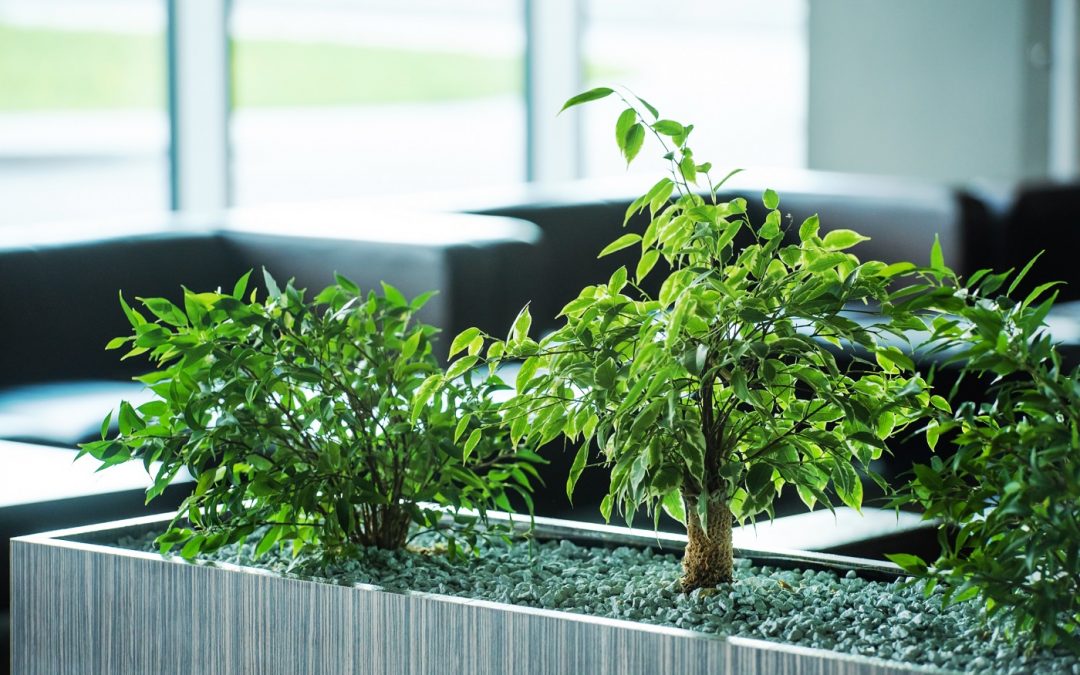Our guide to how office plants can make your workplace greener, healthier and more beautiful. Plus tips for choosing the best plants…
Almost 50 per cent of the UK’s office workers think that plants would improve their workplace. Along with better colour schemes and artwork, it’s one of their top three requests to employers, according to recent research carried out for plant suppliers Ambius.
But, apart from making office space more pleasant and interesting, there is solid scientific evidence to show that plants can significantly reduce indoor office pollution and improve the workplace environment.
Why do we need plants in offices?
Those of us who live in industrialised societies spend up to 90 per cent of our time indoors. So, it’s just as well that we are becoming much more aware of the importance of ergonomic and environmentally friendly office and office furniture design.
Nevertheless, many office staff still have to work in hermetically sealed buildings, with synthetic furnishings, and reduced ventilation. They’re unable to escape from human bioeffluents (the atmospheric pollutants that humans emit) – concentrated groups of people release as many as 150 volatile organic compounds (VOCs) into the air. It’s what causes ‘sick building syndrome’, which is linked to allergies, asthma, eye, nose and throat infections, fatigue, headaches, nervous system disorders, and respiratory and sinus congestion. Who wants to work in a space where pollution levels could be 12 times as high as they are outdoors?
But it does not have to be like this: plants, it seems, can make an office a much healthier place in which to work. Even the most up-to-date and stylish office interiors are missing out if they lack some living, breathing greenery.
Plants are very effective at dealing with these indoor environmental problems:
- Their leaves absorb VOCs and move them down to the roots, where microbes get to work and break them down. NASA research showed that, over a 24-hour period, indoor plants can remove up to 87 per cent of air toxins.
- They release phytochemicals that suppress mould spores and bacteria by as much as 50 to 60 per cent.
- They regulate humidity, releasing about 97 per cent of the water they absorb, which is great for human health and well being, especially in winter when central heating sucks moisture from circulating air.
Why plants are so good for people at work
It was an American biologist, Edward O Wilson, who put forward the theory of biophilia –that people have an innate tendency to seek connection with nature. Since The Biophilia Hypothesis was published in 1984, there have been numerous studies supporting Wilson’s theory that being close to aspects of the natural world, such as plants, makes people feel happier and more contented. More recent studies also show that, by enhancing employees’ well being, biophilia can make an important contribution to the workplace.
In 2014, for example, a team of psychologists from Exeter University published the results of research into the impact of plants in offices. They found that adding even a few indoor plants to the workspace enabled employees to become 15 per cent more productive. The benefits were clear: employees felt better and, as a result, their performance in memory retention and other basic tests improved substantially.
‘What was important,’ said team leader Dr Chris Knight, ‘was that everybody could see a plant from their desk. If you are working in an environment where there’s something to get you psychologically engaged you are happier and you work better.’ (Guardian, 1 September 2014).
Plants can make a tangible difference to every type of office space, large and small, from a busy City finance house with hundreds of staff to a solo freelancer, working from home. And, if you have any outdoor space, it makes sound business sense to make the best horticultural use of this too: install window boxes, planters on roof terraces or in courtyards, or stunning green walls made from real moss.
Which plants work best in offices?
Finding plants that will enhance your workplace involves art and science. Art for the design aesthetic and science to identify which plants will flourish. Factors such as the space available, access to daylight (or lack of it), and the type of lighting, heating and ventilation systems used are all important considerations, as is weather and climate if you are planning to make outside space greener too.
Some of the most efficient office plants are the most familiar, such as:
- Rubber tree plant (Ficus elastica) – helps to remove air pollutants; likes bright, indirect light, near a window with sheer blinds or curtains.
- English ivy (Hedera helix) – great at filtering out airborne faecal particles and formaldehyde; loves a shady spot.
- Parlour palm (Chamaedorea elegans) – another excellent air purifier; low cost, a good space filler, and happiest in bright, indirect light at either end of the day. (A planter on rollers would work perfectly for a parlour palm.)
- Chinese evergreen (Aglaonema) – very efficient at removing toxins; low maintenance, prefers low, indirect light in a warm environment with a little humidity.
- Peace lily (Spathiphyllum) – excellent air cleaners; low maintenance, shade loving plants with attractive white flowers.
- Florist’s daisy (Chrysanthemum morifolium) – one of the best flowering plants around for removing formaldehyde and ammonia from the atmosphere.

Florist’s daisy (Chrysanthemum morifolium). Image credit.
How to make the most of office plants
If you have a small office and a good knowledge of plants and plant maintenance, you may decide to choose and care for the plants yourself.
However, for many medium and large office workplaces, it makes sense to call in the experts; after all, you don’t want those hard-working and life-enhancing plants to become just another administrative chore that you don’t have time to tackle. Office plant specialists have a wealth of knowledge and expertise; they can advise on which plants will work best and where, design planting schemes, install plants and planters, and provide maintenance instructions. Many offer plant maintenance and replacement services – and first aid advice, if any of your plants start to look unhealthy! They are used to working within a wide range of budgets and can help you to create a happier, healthier and more productive work environment.
Five places to buy office plants
You’ll find office plant companies, like those listed below, throughout the UK. We recommend making some initial enquiries to find out what’s involved and how they could help your office become an even better place to work.
1) Camden Garden Centre – Excellent service and advice.
2) Patch – Providing hand-delivered plants tailored to your workspace
3) Ambius – Major plant and scenting specialists with a nationwide reach.
4) Simply Plants – Offering visually-striking displays
5) Plant Plan – Has specialisms including restaurants and hotels, and providing ‘living walls’.
At Rype Office we can help select the best plants for you as part of our free office design service. Plants that have been carefully chosen and positioned not only enhance office design, but also offer a cost-effective, scientifically proven, greener solution to improving the workplace environment, where everyone benefits.

